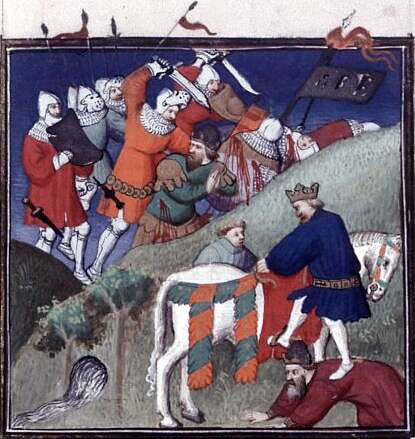Why the West is Christian because of a specific battle • The kidnapping of the King who changed South America forever • And the critical battle that took place on the land of Israel
During the thousands of years of human existence, there have been fierce and important battles in the world between states and empires that have affected many people, for better or worse. However, within these many events, there are also battles that not only mattered at the time, but that changed the course of human history and their influence is still in effect today. These are often events whose great significance was recognized in retrospect and were not necessarily perceived by their mighty power. We have chosen to list five of these fateful events that are somewhat forgotten or unknown enough today despite their tremendous importance.
Battle of Milvius Bridge - This is why the West is Christian
Can you describe the world without the influence of Christianity on most? The answer to that is negative, whether you support it or not. But the truth is that our world is like this because of one major battle that took place on October 28, 312 in the northern city of Rome on the River Tiber.
The battle was between Constantine (337-272) and Maxentius (312-278) the emperor of Rome. In fact, it was a question of who would rule the Roman Empire, which was then divided between two emperors. Constantine's father ruled the empire together with the emperor Diocletian, but he himself was ruled out, though he ruled the eastern part of the empire. The tension between him and Maxentius who ruled Rome and the West became a full-fled war decided on the Millbius Bridge. According to Constantinus himself, he won the night of the battle to be revealed, which led him to mark his soldiers' X mark with a vertical line twisting at the top.
Following the great battle and victory, the head of the empire accepted the Christian religion. In doing so, the battle is a historic turning point in the spread of Christianity in Europe. On a wider examination, the battle constitutes a transitional phase between the classical and the medieval world.
Battle of Manzycart - the beginning of the end of the Byzantine Empire
For about a thousand years, Eastern Europe and much of Asia ruled the Byzantine Empire, which inherited the Roman Empire. The Byzantine army was considered invincible and even the powerful Islamic forces that ruled the Middle East were afraid to attack it. Everything changed because of a confused, betrayal battle near the city of Manzycart.
It all began 11 years earlier, in 1060, when the Seljuk Sultan Al Arslan allowed his Turkish allies to emigrate to Armenia and Asia Minor, where they established cities and farms. The Turks and Seljuks were excellent archers and fast light cavalry, and conquered Byzantine towns in the area mainly because of their tactical ability to attack and retreat quickly to the mountains.
Byzantine emperor Romanus IV Diogenes, decided to put an end to this and embarked on a war campaign in 1070 against the invaders. Initially the Byzantines triumphed, however, following errors in understanding the territory, betrayals of allies, and contempt for the enemy's abilities. The Emperor was defeated on August 26, 1071, near the city of Manzycart and taken captive.
Although he was later released and the Byzantines won other battles, there were two important results to the battle of Manzycart. The Turks and Seleucids stopped fearing the millennial empire, which until then was considered invincible and began to migrate to Asia Minor, flooding it without the Byzantines being able to stop them. On the other hand, the Pope in the West realized that the Eastern Empire would not be able to defend Christianity in the Land of Israel and later declared the Crusades, which hurt the Byzantine Empire even more than Islam.
The second battle in Tarien - Islam is changing the East
The world recognizes the invasions of Mohammedan students into the Middle East and Europe, but too little is learned about Islamic travel to the east, which changed Asia and created Pakistan and Bangladesh, adding huge Islamic minorities to India and other countries.
It all started in the second battle over Tarien, between the Afghan ruler Muhammad Ma'ur and the Hindu caste forces Rajput, led by Perthvirag Chauhan. Both sides fought hard battles, with the Hindus winning first. The turning point was in 1191, when in the Tarain area near Delhi, the two huge armies collided for the second time when the Muslim side alone fought some 120,000 armored fighters. On the other hand, the Hindus brought in a huge army that included thousands of elephants and a larger number of warriors (no exact number, the Indian Chronicle speaks of 300,000 warriors but that is an exaggeration).
This time, unlike previous battles, Muhammad Major used a light cavalry tactic that startled the Indian elephants, causing a big mess. In addition, they were able to break through the Indian power center because of their speed. In a disarray, the smaller Muslim army defeated the Sultanate of Delhi as a major marched with its army to Bengal, bringing the Indian subcontinent largely to Islamic rule until 1526.
Battle of Ein Jaalot - the Mamluks are absorbing the Mongols
This is one of the decisive battles in Middle Eastern history, during which Christian Mongols were repulsed before the Mamluk army, which eventually left the entire region under Islamic rule.
The battle took place on Friday, September 3, 1260 in Eretz Israel, near Ma'ayan Harod. The Mamluks were led by the Mamluk Sultan Kutuz and Commandant Beavers (who murdered Kutuz after the battle and became the Sultan himself). Ironically, the Crusader kingdom in Israel refrained from assisting the Mongols despite being Christian and even allowed the Mamluk army to move through its territory.
The battle is likely to take place this evening, with the west sun blinding the Mongols who were in the country with missing forces, about 10,000 fighters in total, since most of the force returned to Asia after the death of the Great Khan Mongka (Genghis Khan's grandson) with his brother Holgo Khan , Who returned to seize the crown after already conquering all of Syria, Lebanon and northern Israel.
The Mamluks, on the other hand, had about 15,000 fighters, and during the battle a Muslim commander who worked with the Mongols also moved to the Mamluks. The battle that took place when the sun dazzled the Mongols, with some of their army cheating on them and the Crusaders assisting in intelligence to the enemy, and therefore ended in a victory from a crusading monarchy. The victory temporarily halted the westward expansion of the Ilhanjan state to the east coast of the Mediterranean.
The Battle of Kahamarca - South American Revolution
With 168 warriors and cavalry, the Spanish Francisco Pizarro conquered the entire Inca empire and completely changed the history of South America, due to a planned act of betrayal that took place on November 16, 1532, in the city of Kahamarca.
The incident began when Pizarro approached the Inca king of Atalapa and asked to meet with him within the city, while the king surrounded it with 80,000 of his warriors and prepared to attack the Spanish. The king refused a meeting but because his camp, unlike most of his army, was in the valley, Pizarro took advantage of the situation, attacked Atwalpa's guard with firearms, killed all the Inca senior military commanders and captured the king. All this without loss.
The fall of the king and the elimination of the high command created chaos among the rest of the military, who would otherwise easily crush the Spaniards. So in one act, South American history changed forever.















